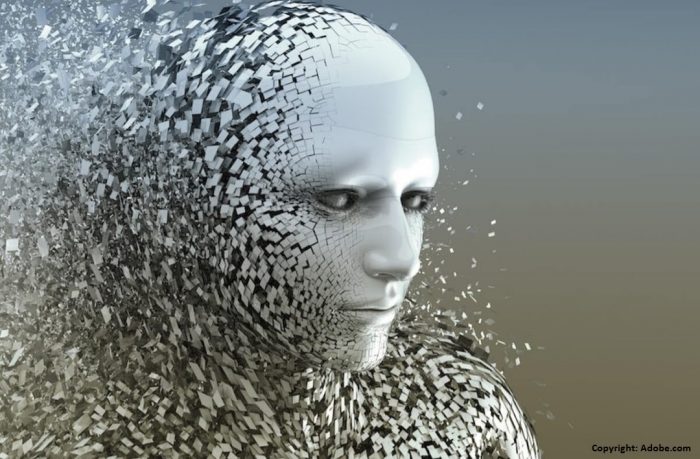When we think of Artificial Intelligence (AI) images seen in movies like the Matrix and The Terminator come to mind. It is a foreign concept we place in a distant future, far from being realized. I can remember watching the Jetsons as a kid and thinking it would be amazing to speak with someone on the phone and see them or have a household IRobot like Rosie to vacuum our floors. And here we are in 2020 and AI is here and will most likely be more prevalent in the future.
Over the last few decades AI has progressed and our reliance on it has grown. It has become an extension of ourselves through our use of computers and cell phones. We rely upon it to perform a variety of tasks, from simply checking the spelling of a document to providing detailed directions for a trip we are planning. Questions are answered in seconds and we are accessible 24/7 no matter where we are or what we are doing.
While these developments have brought positive changes and improvements to our existence, continued advancements will most likely pose significant changes to the way we function, our society and the human experience. There is concern as to whether AI will morph us into cyborgs (i.e., beings with both biological and technological components) with superior intellect that could force us (as we are now) into extinction.
Elon Musk, the founder of Tesla, has been a driving force in advancing AI. Musk founded Neuralink, a company that manufactures implantable brain neurotransmitters. One of its most significant achievements was the development of microchips that are surgically implanted in the brain to enable people with physical challenges to move prosthetic limbs, speak and hear. This has improved the lives of countless number of people with debilitating, physical limitations.
But what if AI is advanced further? Since AI is constantly improving and gets smarter and smarter through its “experiences” it will reach a point where it could be much more intelligent than us. In fact, Musk has expressed this concern, so his desire is to create technology that would work in conjunction with humans, like the medical application. But even with this intention, the outcome remains the same: the creation of a more intelligent human that will compete and potentially compromise our current, “original” version.
The latest undertaking would provide for much more than a remedy to overcome physical limitations. Microchips would be implanted in the brain by a skilled neurosurgeon to “upgrade the brain” with computer capability. It has been said that as technology improves, the procedure will be simplified and will be as easy as outpatient Lasik surgery. Sounds surreal, doesn’t it?
The advanced microchips will enable humans to connect the brain with the internet, other people, and a wealth of information. Much like using Alexa or Google Home, an inquiry will be initiated by way of a simple thought and received much faster. Anything you can think of will be able to be shared. Like a virtual wedding or event that never happened, all resulting from a thought in your mind. We will be able to drive our cars just by thinking about it and figure out complex problems in a matter of seconds. And while we will be sharing thoughts and asking questions, we will be uploading our minds to the (brain) internet.
Another related project of Musk’s, called Starlink, will create an internet web around the globe via 40,000 satellites; they have begun to be launched in Arizona during the last few weeks. While this will provide internet access in areas where there is none, it could potentially be used for the (brain) Internet in the future.
You may say “Well, that sounds like some interesting technology, but I would never have microchips implanted in my brain.” But if others in the workforce opt to take this route, it leaves us “plain, old, “natural” humans with a deficit. We will be intellectually challenged to compete with those that have them and we may find it necessary to go with the trend to survive and succeed.
Although this is a foreign concept and a bit scary to the current adult population, I wonder if it will be less alarming to younger generations who grew up with advanced technology? Will they perceive it as a necessary step to human advancement?
The existence of a human brain functioning in conjunction with computer technology also poses a variety of potential threats. Like our devices we could be subject to being hacked, infected with viruses, or used as a form of weaponization. It is difficult to comprehend the many potential threats that can occur, but the possibilities are quite intimidating.
As with most advances, AI has its benefits. And with every technological advance, the human existence changes. But the incorporation of AI technology in our brains (beyond medical necessity) is different because it will not only change our existence but has the potential to change who we are as a species. And that is something that should be given serious consideration as we move forward.
While we may be able to obtain optimum intelligence, we will lose a significant degree of our uniqueness. We will all be smart. We will not be as apt to identify “gifted” people – there will be no Albert Einsteins or Madame Curies. There may be little or no need for institutions of higher learning. Our dependence upon AI will most likely increase as future generations become more and more reliant upon it and the spirit that drives our creativity and ingenuity may be diminished. One can hope that a higher form of intelligence will correct some of the wrongs of this world – and perhaps it would – but it is sad to think of the prospect of an altered human spirit.
Our perfect imperfection will be less noticeable. We will become more the “same” and less apt to rely on our natural gifts.
Human innovation is a wonderful thing. It has solved problems, improved lives and, in most cases, has made the world a better place. But the ongoing development of AI to increase human intellect and alter the way we communicate is another story. It presents several ethical and moral dilemmas. A line is crossed when we begin to consider altering our brain for these purposes. It touches upon our functioning and how we “shine” just being ourselves.
If the human spirit is altered it could lessen the beauty of our individual knowledge, personalities and God given gifts. We may be a programmed people. Reliant and guided by technology and our natural, intellectual traits diminished. And that would be an irreparable, unforgivable tragedy.
However, I highly doubt that the true essence of our humanity – the spirit of our personalities and our expression of love and compassion – can ever be duplicated and/or eliminated. I often think of how we have tried to replicate nature, like attempting to make a cell tower look like a tree. The “tree” tower may blend in a little better than a silver, high tech structure, but will never look like a real tree. Nor will altered humans pass for those that are genuine.
We will continue to experience emotions and feelings because of our DNA. We will continue to have a natural bond with our families, friends, children, and care for those in need. We will continue to exercise our biological instincts and the most beautiful, treasured, irreplaceable characteristics of our humanity. A life force that has endured and guided us for centuries. And that is something that technology can never replicate or replace.
Sources:
“The Coming Transhuman Era” – Jason Sosa at TEDX Grand Rapids, MI (https://youtu.be/1Ugo2KEV2XQ)









Read 7 comments and reply